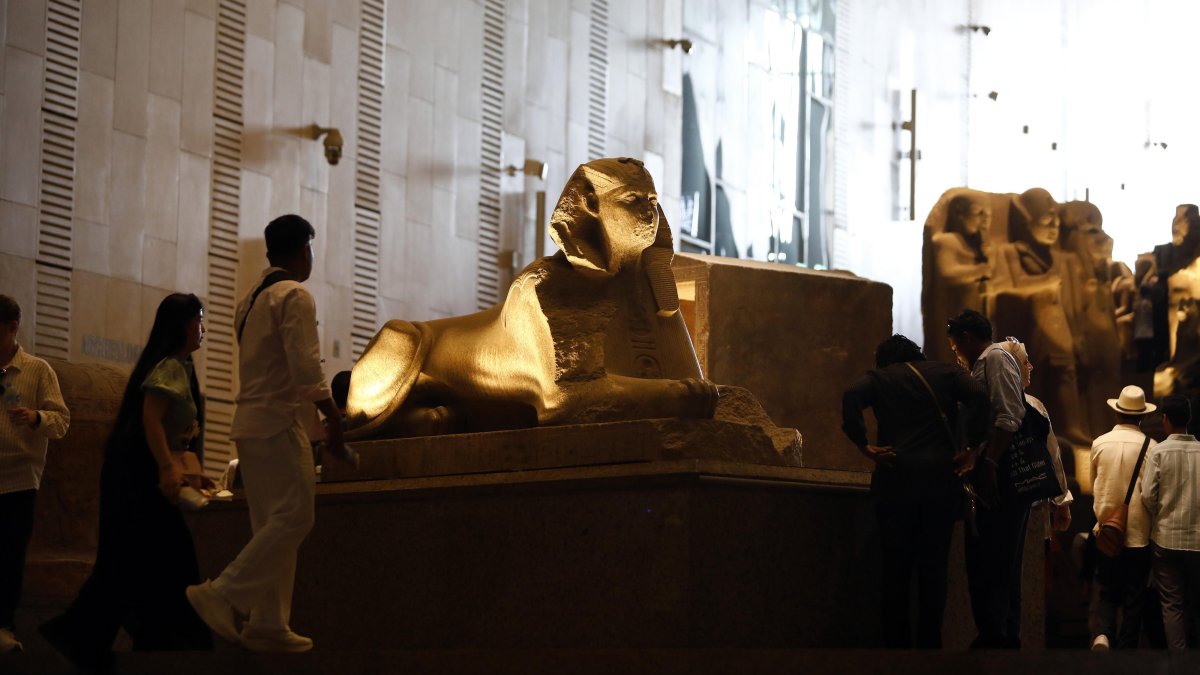The Grand Egyptian Museum, located near the Giza Pyramids - including the Great Pyramid of Khufu, one of the Seven Wonders of the Ancient World - will open to visitors the day after its official inauguration on Nov. 3.
The museum brings together more than 100,000 archaeological artifacts spanning eras from pre-dynastic Egypt to the Greek and Roman periods. Among its highlights are the treasures of Pharaoh Tutankhamun - known as the “Boy King” and the “Golden Pharaoh” - the solar boat of Pharaoh Khufu, builder of the Great Pyramid, and the collection of his mother, Queen Hetepheres I.
Situated west of Cairo with a panoramic view of the Giza Pyramids, the Grand Egyptian Museum allows visitors to see all of Tutankhamun’s treasures displayed in one place for the first time.
In an interview on Saturday, Egyptian archaeologist Magdi Shakir told Anadolu Agency (AA) that the museum’s opening will offer visitors a “unique experience.”
“The museum presents an impressive display with more than 5,000 artifacts belonging to Pharaoh Tutankhamun, who lived over 3,000 years ago,” Shakir said. “It houses some of the world’s most beautiful archaeological treasures and honors one of the most famous pharaohs in history.”
Shakir said visitors would enjoy not only the artifacts but also the way they are presented. “More than 5,000 items, including Tutankhamun’s iconic mask, will be exhibited in two halls covering over 7,000 square meters,” he said.
Each hall will showcase artifacts from specific historical periods, while other sections will explore ancient Egyptian beliefs and religious practices.
“In the past, artifacts from the Old, Middle or New Kingdoms were displayed separately,” Shakir said. “Now, each theme is presented in a panoramic narrative. Every artifact in the Grand Egyptian Museum follows a unique curatorial story, offering a fresh perspective even on familiar pieces - making it an unprecedented experience.”
He noted that the museum’s design facilitates visitor flow, with dedicated areas for transportation, dining, and souvenirs. From the “Window of Eternity,” visitors will be able to view the Giza Pyramids. The museum is expected to attract between 5 million and 8 million visitors annually.
Egyptian archaeology researcher Omar Hadri described the museum as a “massive project.”
“This is not just a museum,” Hadri said. “It’s a symbol that retells Egypt’s cultural heritage to the world. Alongside the Pyramids, the Egyptian Museum in Cairo, and the Coptic and Islamic art museums, it adds a new dimension to the country’s historic landscape.”
Hadri added that every museum built in Egypt marks a historical achievement. “Egypt is a land of civilizations, home to millions of artifacts stored in warehouses, displayed in museums, and spread across hundreds of archaeological sites,” he said.
The museum’s opening ceremony is expected to be attended by Egyptian President Abdel Fattah el-Sissi along with numerous heads of state and world leaders.
According to Egypt’s Ministry of Tourism and Antiquities, the idea of establishing the Grand Egyptian Museum emerged in the 1990s.
The museum, constructed on the Giza Plateau facing the pyramids, was designed with triangular architectural elements in reference to its surroundings. Its foundation was laid in 2002, construction began in 2005, and the building was completed in 2021.
Covering an area of 300,000 square meters, the Grand Egyptian Museum is one of the largest archaeological museums in the world. It was conceived not only as an exhibition space but also as a center for culture, education, and recreation.
Among its most significant collections are the more than 5,000 artifacts belonging to Tutankhamun.
Before the official inauguration, the museum conducted trial openings to test its readiness and the visitor experience. During that phase, guests were able to enter the main exhibition halls and several other sections. However, the halls displaying Tutankhamun’s complete treasure collection will be open to the public for the first time following the museum’s formal opening. By Daily Sabah, Istabul






